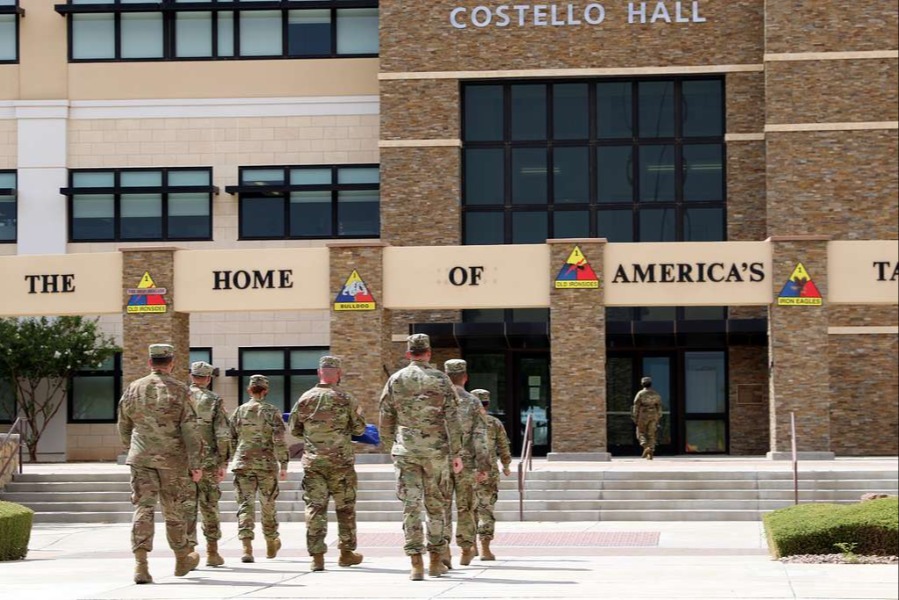Today's Headlines and Commentary
The New York Times tells us that in advance of his address to a joint session of Congress tonight, President Donald Trump is giving his presidency an A thus far. In an interview with “Fox and Friends,” Trump blamed former President Barack Obama for organizing the opposition against him, called House Democratic leader Nancy Pelosi “incompetent,” and criticized White House Press Secretary Sean Spicer for his handling of leaks.
Published by The Lawfare Institute
in Cooperation With

The New York Times tells us that in advance of his address to a joint session of Congress tonight, President Donald Trump is giving his presidency an A thus far. In an interview with “Fox and Friends,” Trump blamed former President Barack Obama for organizing the opposition against him, called House Democratic leader Nancy Pelosi “incompetent,” and criticized White House Press Secretary Sean Spicer for his handling of leaks. However, Trump claimed that he would give himself “a C or a C-plus” on messaging.
Foreign Policy writes that Trump’s budget proposal, which would increase the current budget for the Pentagon by $54 billion and slash funding to other agencies, is set for a showdown with the State Department and members of Congress. The State Department will be required to send the White House a budget reducing as much as 30 percent of its current budget, forcing the elimination of foreign assistance programs and a massive reorganization of the Department. Due to Secretary of State Rex Tillerson’s lack of staff and opposition in the White House to diplomacy, it is unclear whether Tillerson will mount a defense of his prerogatives.
The Washington Post informs us that more than 120 retired generals have reacted negatively to the budget, sending a letter to Congressional leadership urging them not to agree to slashes in the State Department’s budget. The letter’s signatories included several past service heads and combatant commanders, including Keith Alexander, former head of the NSA and U.S. Cyber Command, and John Allen, former commander of U.S. forces in Afghanistan. The generals referenced Secretary of Defense James Mattis’s comment during his confirmation hearings that, “If you don’t fully fund the State Department, then I need to buy more ammunition.” A copy of the letter can be found here.
The Wall Street Journal writes that the White House defended its decision to ask lawmakers and intelligence officials to rebut allegations of ties between Trump associates and Russia, dismissing calls for a special prosecutor to investigate. Over the weekend, Representative Darrell Issa (R-Calif.) called for the appointment of a special prosecutor to probe the ties, but later walked back the calls yesterday by saying he preferred an independent review. Other Republican lawmakers have also expressed concerns about the independence of congressional investigations, including Senator Susan Collins (R-Maine). Calls for independent review come close on the heels of reports that the chairman of the Senate Select Committee on Intelligence, Senator Richard Burr (R-N.C.), was directed by Sean Spicer to call reporters to push back against reports of the ties. Notably, Representative Devin Nunes, chairman of the House Permanent Select Committee on Intelligence, has downplayed Russian ties before having all the evidence.
The Times tells us that the Kremlin has been emboldened by what it sees as weakness on the part of the Trump administration, continuing to test the administration on the military front by buzzing American warships in the Black Sea and placing warships off the coast of the United States. According to Sergei A. Markov, a member of the Russian advisory group Civic Chamber, “right now the Kremlin is looking for ways that Russia can use the chaos in Washington to pursue its own interests.”
State Councilor Yang Jiechi, China’s top diplomat, became the highest-ranking Chinese official to meet with the Trump administration when he briefly spoke with Trump and his Trump advisers yesterday, according to the Journal. Yang met with senior White House advisor Jared Kushner, National Security Adviser H.R. McMaster, and chief White House strategist Steve Bannon, and will meet today with Secretary of State Rex Tillerson. Yang is expected to set up a meeting between Trump and Chinese President Xi Jinping.
The AP reports that Trump is expected to sign a new refugee and immigration executive order tomorrow. The administration had initially announced that the new order would be released last week before quietly delaying its signing only days before reports of tension between the administration and the Department of Homeland Security over the White House’s perceived politicization of intelligence in support of the order. The new order will come as the Ninth Circuit has denied the Trump administration’s motion to stay proceedings in the ongoing litigation surrounding the first order.
Michael Morell, former acting director and deputy director of the CIA, and Robert Pape write in the Post that Trump’s travel ban ignores that radicalized U.S. citizens pose the greatest threat to national security.
Politico reports that national security adviser H.R. McMaster advised Trump last week to stop using the phrase “radical Islamic terrorism,” calling it “unhelpful.” Even so, the phrase will likely remain in Trump’s speech to a joint session of Congress tonight, even after reviews by McMaster and his staff. Trump’s political advisers fear that a sudden change in rhetoric could open him up to charges that he is not speaking openly and plainly with the American people. Whether the phrase is used in the speech and moving forward will be an early indication of McMaster’s sway in the White House.
The AP tells us that Defense Secretary James Mattis presented the Pentagon’s plan to defeat ISIS to a Cabinet-level meeting of the National Security Council, though it was unclear if Trump attended. Those familiar with the plan said it will likely lead to decisions that will mean more U.S. military involvement in Syria, including group troops, but will also include nonmilitary elements that are designed to continue to squeeze ISIS finances, limit recruiting, and counter propaganda. Marine Corps General Joseph Dunford, the chairman of the Joint Chiefs of Staff, has stressed that the U.S. should be careful that, in defeating ISIS, it does not create other problems—in contrast to Trump’s pronouncements that the military should only focus on trying to “obliterate” ISIS.
Reuters informs us that having taken the town of al-Bab from ISIS forces, Turkish-backed forces will move toward the northern Syrian town of Manbij now that they have taken the town of al-Bab. Turkish President Recep Tayyip Erdogan announced that Turkish forces will next focus on pushing the Kurdish YPG to the east of the Euphrates River, ruling out any chance of Turkish cooperation with the YPG-aligned Syrian Democratic Forces.
Foreign Policy writes that the U.S.-backed SDF is more concerned about Turkey than ISIS as it moves to take Raqqa back from ISIS. As U.S. forces provide training and supplies, the Trump administration weighs whether it will continue support for the SDF and the Kurds over Turkish objections.
Reuters notes that the U.N. Security Council will vote today on whether to ban the supply of helicopters to the Syrian government and to sanction Syrian military commanders over their use of chemical weapons, despite a Russian pledge to veto the resolution. Russia has vetoed six resolutions on Syria since 2011, with China joining for five. British U.N. Ambassador Matthew Rycroft said yesterday that the UNSC needed to send a “strong, clear message that the international community means business on preventing the use of these abhorrent weapons.”
CNN tells us that a report released by the Israeli State Comptroller criticized Israel’s preparation and handling of the 2014 Gaza War, offering a strong indictment of the Netanyahu government and their apparent lack of strategic goals when the 50-day war started. Those goals should have come before the war was launched, “as required in a proper decision making process,” according to the report. Haaretz provides additional commentary on the report, which was strongly criticized by Prime Minister Benjamin Netanyahu before its release.
NBC reports that last month’s commando raid in Yemen that resulted in the death of a U.S. Navy SEAL and a number of Yemeni civilians has so far yielded no significant intelligence. The accounts from senior officials come as Bill Owens, whose son lost his life in the attack, has questioned the premise for the raid so soon into the Trump administration during an interview with the Miami Herald. A senior Congressional official said the Trump administration has yet to explain why the use of troops on the ground in Yemen was necessary. On Fox and Friends, Trump rejected arguments that he bears responsibility for Ryan Owens’ death, saying, “This was a mission that started before I got here.”
ICYMI: Yesterday, on Lawfare
John Bellinger argued that Defense Secretary James Mattis should say “No Thank You” to increased defense spending that is financed by cuts to diplomacy and foreign aid.
Steve Vladeck considered the implications of H.R. McMaster’s appointment as national security adviser for civilian control of the military through the lens of a number of Supreme Court cases.
Nora Ellingsen explained that a leaked DHS report contradicts claims by the White House that individuals from the seven Muslim majority countries in the refugee executive order pose a terrorist threat.
Ammar Abdulhamid examined Russian President Vladimir Putin’s past and potential future course in Syria.
Andrew Kent analyzed how we will know whether the Russia-Trump investigations by Congress and the FBI are credible.
Paul Rosenzweig illustrated why federal IT will never be secure.
Dustin Lewis, Naz Modirzadeh, and Gabriella Blum highlighted how their new report for Harvard Law School argues that international law provides insufficient guidance to ascertain the end of many armed conflicts as a factual, normative, and legal matter.
Email the Roundup Team noteworthy law and security-related articles to include, and follow us on Twitter and Facebook for additional commentary on these issues. Sign up to receive Lawfare in your inbox. Visit our Events Calendar to learn about upcoming national security events, and check out relevant job openings on our Job Board.





